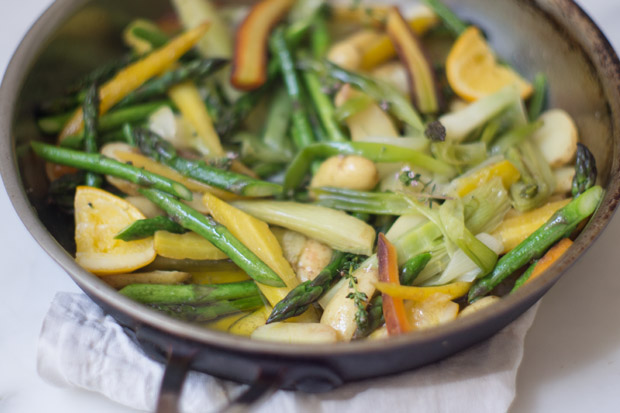Add Olive Oil to Vegetables to Lower Blood Pressure
Tuesday, May 27, 2014

One of the main characteristics of the Mediterranean diet is the frequency of vegetable-rich meals and salads cooked in plenty of olive oil. And while we know that the addition of olive oil to vegetables can increase the absorption of vitamins and antioxidants, it appears that this powerful combination has another significant health effect: it may protect from high blood pressure.
A new study published in the journal PNAS, suggests that an eating pattern that combines unsaturated fats (such as olive oil) with specific vegetables rich in in nitrite and nitrates can protect from hypertension. Nitrite rich vegetables are mainly green leafy types such as spinach, wild greens, and root vegetables. These vegetables are consumed on a daily basis within a Mediterranean diet and always with olive oil. Researchers found that when these two foods are combined you have the formation of nitro fatty acids.
For this study, mice were used to examine how nitro fatty acids control blood pressure by inhibiting an enzyme that is known to regulate blood pressure.
The results showed that the mice genetically engineered not to be reactive to this enzyme process had no change in blood pressure, while in normal mice the nitro fatty acids lowered the blood pressure.
The researchers concluded that the common combination of unsaturated fatty acids such as olive oil with these vegetables contributes to the protective action of the Mediterranean diet.
In another study published in the journal PLOS ONE, researchers were able to demonstrate by using mass spectrometry, that extra virgin olive oil as well as fresh olives are also a source of nitro fatty acids on their own, thus potentially contributing even more to the antihypertensive effect.
 0
Like
Published at 2:21 PM Comments (0)
0
Like
Published at 2:21 PM Comments (0)
Patent Applicant Claims Olive Polyphenols Help Blood Sugar Control
Tuesday, May 27, 2014
A natural health products group is seeking an international patent for an olive leaf extract it says can help prevent or manage insulin sensitivity, including type 2 diabetes.
It claims clinical trials show oral administration of an olive leaf extract containing the olive polyphenols and antioxidants oleuropein and hydroxytyrosol “may have significant benefits in treating, reducing the symptoms of and/or preventing type 2 diabetes, in both at risk subjects and those already with the disease.”
Comvita Ltd subsidiary Apimed Medical Honey Ltd, based in New Zealand, said in its patent application before the World Intellectual Property Organization that in a double blind, placebo controlled trial involving 46 overweight middle-aged men at risk of developing future metabolic syndrome – which can be a precursor to diabetes – supplementation with olive leaf polyphenols for 12 weeks saw significant improvement in insulin sensitivity and pancreatic β-cell responsiveness. This matters because, “for impaired glucose tolerance to progress into diabetes, patients need to become both insulin resistant, and lose pancreatic β-cell secretion capacity,” the application says.
The olive (Olea europaea L.) leaf extract used in the trial was a product sold by Comvita. Participants were told to take four capsules as a single dose once a day, which would deliver a daily total of 51.1mg of oleuropein and 9.7mg of hydroxytyrosol.
Apimed said in its patent application that “folk medicine using olive plants to treat diabetes has existed for centuries,” but only recently has research on the medicinal properties of olive products focused on olive polyphenols – particularly oleuropein and hydroxytyrosol (a breakdown product of oleuropein).
“Polyphenols are found in most edible plants, and are considered to deliver the health benefits of chocolate, coffee, green tea, and red wine. Paralleling the growth in scientific knowledge in olive polyphenols, the olive nutraceutical market is expanding. As the concentration of olive polyphenols is far more potent in olive leaves compared to the fruit or olive oil, this once discarded by-product of tree pruning is now a valuable commodity,” it said.
But the expansion in the olive nutraceutical market has not been accompanied by a relaxation in the health claims companies can make in Europe and the United States. As stated by Apimed itself in its application, the European Food Safety Authority allows a health claim linking consumption of olive oil polyphenols to protection of blood lipids from oxidative damage, but so far no similar claim has been approved for glucose homeostasis (blood sugar control). Also, a recent U.S. Food and Drug Administration warning letter provided a sobering reminder for dietary supplement companies to be careful in the claims they make about their products. The letter in January to Pennsylvania-based Exclusive Supplements raised issues including that the FDA considered therapeutic claims (since removed) on the company’s website about its BioRhythm brand Olio product – which contains extra virgin olive oil – established the product was a drug because it was “intended for use in the cure, mitigation, treatment, or prevention of disease,” and such drugs need prior FDA approval.
Other research has found that following a Mediterranean diet has a preventative effect against diabetes. In 2011, a trial within the PREDIMED study showed a Mediterranean diet reduced the risk of type II diabetes by almost 50 percent compared to a low fat diet.
 0
Like
Published at 2:15 PM Comments (0)
0
Like
Published at 2:15 PM Comments (0)
Virgin Olive Oil consumption on the rise in Spain
Thursday, May 1, 2014
 Consumption of sunflower oil rose 9.7 percent last year while that of olive oil fell nearly 1 percent, but olive oil remains by far the most used edible oil in Spanish households, according to the latest Spanish food consumption data. Consumption of sunflower oil rose 9.7 percent last year while that of olive oil fell nearly 1 percent, but olive oil remains by far the most used edible oil in Spanish households, according to the latest Spanish food consumption data.
The Spanish Ministry of Agriculture, Food and Environment (MAGRAMA) figures also show that while consumption of refined olive oil in Spanish homes decreased 6.8 percent on 2012, the virgin olive oil category managed to grow 12.1 percent.
Overall, each person in Spain consumed an average of 13.56 liters of edible oil in 2013 (up from 12.8 in 2012), of which 5.22 liters was refined olive oil (marketed as “olive oil”) and 4.09 liters was virgin olive oil. That makes a per capita total of 9.31 liters for olive oil overall and adds up to nearly 423 million liters, down 0.8 percent on 2012, while the next most consumed oil, sunflower oil, averaged 3.72 liters per person and totaled about 169 million liters.
Refined olive oil accounted for 38.5 percent of the total volume of oil consumed in Spanish homes last year and 44.2 percent of value, while the respective figures were 30.2 and 38.9 percent for virgin olive oil and 27.4 and 14.4 percent for sunflower oil.
The vast majority – 92.1 percent – of edible oil for household consumption was bought in hypermarkets, supermarkets and discount stores.
In a press release, MAGRAMA said its study of edible oil consumption also showed that the households with the highest consumption of refined olive oil were those in Galicia, the Canary Islands, and Asturias, and comprised of couples with children aged above 17 or without children, and retirees.
Consumption of virgin olive oil was highest in cities of more than 100,000 inhabitants in the regions of Andalusia, Madrid, Cantabria and the Basque Country and also among households formed by couples with older children or without children, and retirees.
Sunflower oil was most popular in towns with less than 10,000 inhabitants in Galicia, Castile and León, and Cantabria, and among households comprised of couples with children aged from about seven and above.
 0
Like
Published at 7:23 PM Comments (0)
0
Like
Published at 7:23 PM Comments (0)
Spam post or Abuse? Please let us know
|
|